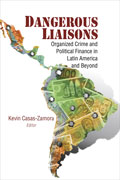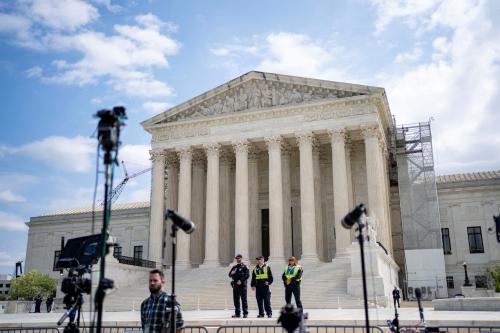On October 15, the Latin America Initiative at Brookings hosted a discussion on the intersection of politics, campaign financing and organized crime in Latin America. Kevin Casas-Zamora, secretary for political affairs at the Organization of American States, discussed the findings and conclusions from his edited volume, Dangerous Liaisons: Political Finance and Organized Crime in Latin American and Beyond.
The risk that money from organized crime, and drug trafficking in particular, poses to the integrity of political parties and electoral processes has been cited in country after country [in Latin America]. — Kevin Casas-Zamora, from Dangerous Liaisons
 Casas-Zamora, a former senior fellow at Brookings, introduced the collection of articles on the intersection of organized crime and politics. “The penetration of organized crime in campaign finance has long been the subject of endless speculation” yet before this book many scholars assumed that research on this issue was impossible. “[A] drug lord is not your run-of-the-mill political donor … with an abnormal power to coerce the will.”
Casas-Zamora, a former senior fellow at Brookings, introduced the collection of articles on the intersection of organized crime and politics. “The penetration of organized crime in campaign finance has long been the subject of endless speculation” yet before this book many scholars assumed that research on this issue was impossible. “[A] drug lord is not your run-of-the-mill political donor … with an abnormal power to coerce the will.”
Why Latin America? Casas-Zamora gave four reasons that organized crime has a more pervasive presence in Latin America than elsewhere in the world:
- Frequent electoral turnover makes the political structure more vulnerable and requires politicians to need more funding, legal or otherwise;
- Enforcement of political finance laws is incredibly poor;
- Decentralization makes local authorities more vulnerable to organized crime; and
- Political parties are precarious and therefore easily infiltrated.
The capture of parties and elected officials by moneyed interests is bad news for democracy in the best of cases. At a minimum, it compromises the premise of political equality that supports the whole edifice of democracy, reflected in the principle of one person, one vote, and stunts the ability of parties and leaders to channel their efforts toward meeting broader social demands. Such a loss of political autonomy is serious if it occurs vis-à-vis legitimate interests, business or otherwise. It is, however, devastating when it involves organized crime. — Casas-Zamora, from Dangerous Liaisons
Harold Trinkunas, senior fellow and director of the Latin America Initiative, moderated the discussion and observed that “Many prescriptions that are being followed in the United States are diametrically opposed to the ones that Kevin is recommending” for Latin America. The U.S. is creating an environment of less transparency and less enforcement that might be attractive to corruption and organized crime, he said. “The really disturbing trend,” said Casas-Zamora, “is how transparency rules are under siege now.”
Thomas Mann, a Brookings senior fellow and expert on campaign finance issues, observed that “Some countries, like ours, are deeply influenced by organized crime and drug trafficking but probably don’t have the same levels of vulnerability in their national and federal politics as other countries do. But that doesn’t mean we don’t have serious problems. We are no longer such a model for democracy.”
Eric Olson, associate director of the Latin America Program at the Woodrow Wilson Center, talked about organized crime’s business model, which is “primarily a local phenomenon” focused on infiltration at the local level either through the protection of routes for illegal material or territorial control. “If you don’t take the bribe … you might as well resign yourself to taking a bullet,” Olson said.
… data published by Forbes magazine, revealing the list of the world’s wealthiest people, burst the belief that illicit economies cannot garner enough influence to merit political attention. In 2010 Forbes ranked Mexican drug kingpin Joaquín “El Chapo” Guzmán 701th on its list of magnates with a fortune of $1 billion, suggesting that criminal organizations’ economic muscle, like any other, has to be carefully monitored to see what kinds of links it establishes with the democratic political system. — Leonardo Curzio, from Dangerous Liaisons
Casas-Zamora emphasized freedom of the press as the most important element in ridding these countries of organized crime and the subversion of democracy they bring. Ultimately, transparency and enforcement are essential to remove organized crime and maintain its absence—both in Latin America and elsewhere.
Full event audio is now available.
Learn more about the book, Dangerous Liaisons.
Colleen Lineweaver contributed to this post.


Commentary
Political Finance and Organized Crime in Latin America
October 16, 2013